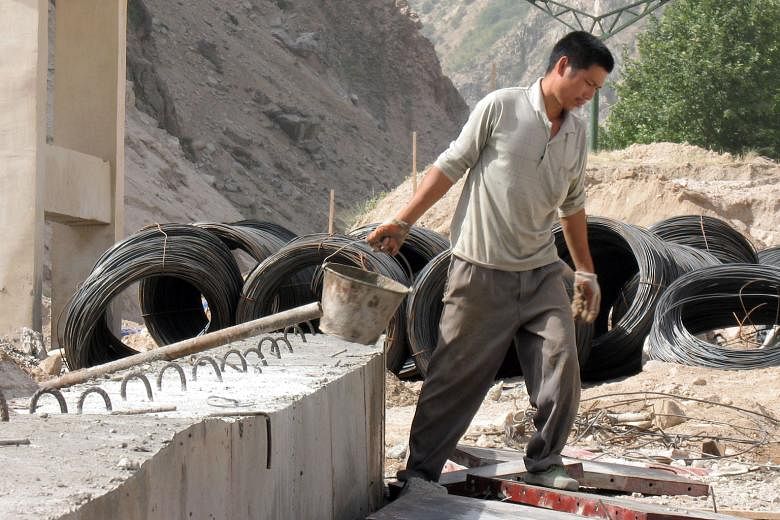DUSHANBE (Tajikistan) • At a bazaar in Tajikistan capital Dushanbe, once a far-flung outpost of the former Soviet Union, cheap goods from neighbouring China are helping to offset the pain caused by Russia's economic meltdown.
As the low world prices for Russian energy exports and Western sanctions over Ukraine stir up economic trouble in Russia, Tajikistan has seen its national somoni currency weaken and thousands of migrants drift back home to a mostly jobless environment.
Last month, the country's national bank announced that remittances - mostly transfers from Russia where close to half of Tajikistan's working age males are believed to work - had fallen by over 40 per cent, compared with the first quarters of last year and this year.
Yet the economic bonds tying the nation of eight million to China are growing stronger every day.
Beijing's economic transformation of the lands west of its restive Xinjiang province has gathered pace in the last decade, overtaking Russia as the main trade partner of four of the five Central Asian countries that gained independence from Moscow in 1991, as it splurges billions on roads and pipelines to link up the disjointed region.

"China is certainly the most visible player economically, and the loudest one," said Mr Raffaello Pantucci, director of International Security Studies at the Royal United Services Institute in London. "The amounts of money that you see being allocated or discussed when Russian leaders or individuals visit the region are always eclipsed by those that follow Chinese visits."
Publicly, Russia has not complained at the growing Chinese economic dominance in its one-time backyard while the pair share membership of the Shanghai Cooperation Organisation (SCO), which includes four Central Asian states.
Moscow is also hopeful it will be a core beneficiary of China's Silk Road vision, but has tellingly resisted the creation of a development bank within the SCO, reportedly fearful it would expose China's seniority in their regional partnership.
For Tajikistan, lacking the resources of other Central Asian states - Kazakhstan, Turkmenistan and Uzbekistan - China's belt is a lifeline. Beijing has pledged to invest at least US$6 billion (S$8.1 billion), or the equivalent of 70 per cent of the country's annual gross domestic product, over three years from last September.
"China has realised a range of projects in Tajikistan, from strategic highways to electricity transmission lines, cement factories and gold mining projects," said Mr Farrukh Soliev, head of the department of external economic relations at Tajikistan's Development and Trade Ministry. "Every year, our partnership grows."
Tajikistan will also reap significant transit fees from a branch of a gas pipeline that should carry 65 billion cubic metres of gas from Turkmenistan into China by 2020. And a connector road Beijing is building in neighbouring Kyrgyzstan will enable Tajik traders to take goods to Russia without crossing into Uzbekistan, a country with whom Dushanbe has sticky relations.
But with China now owning close to half of the country's external debt of over US$2 billion, there is apprehension that a traditional dependency on Russia is being traded for one on China.
"Of course, this support is extremely timely but is it all just out of good neighbourliness? Before taking these credits, we should ensure we know how to use them because, one day, China will want that money back," said Mr Muzaffar Olimov, director of the Sharq analytical centre in Dushanbe.
AGENCE FRANCE-PRESSE

